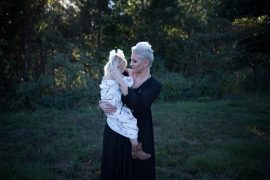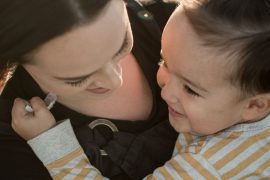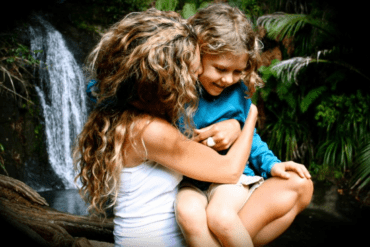By Sarah R. Moore
Here is Part 4 from my recent interview with Tina Payne Bryson, Ph.D. about her incredible new book, The Bottom Line for Baby. In this segment, she talks about the scientific support for gentle parenting.
You talked about gentle parenting and attachment parenting early on, and said how it certainly can be linked to secure attachment, but not necessarily. Some of the biggest pushback we get for gentle parenting sounds like this:
- “You’re coddling your child.”
- “You’re creating a mama’s boy / daddy’s girl”
- “This child is never going to leave your side; never be self-sufficient.”
So, for the parent who wants to breastfeed, possibly even do extended breastfeeding; for the parent who wants to baby wear; for the parent who wants to sleep with their child safely in the same room; and practise all of these crunchy / positive / conscious / gentle parenting (or whatever you want to call it) – practise THIS way of parenting versus the mainstream alternative:
- Is there science and that either supports or discourages this type of responsive parenting?
- And along with that, you mentioned earlier on in the call that gentle parenting can be exhausting. I parent this way, myself, and always have. And yeah, seven years into my child’s life, I still sometimes have dark circles under my eyes. There are days when I’m just plain tired. So, do people ever have more than one child when they have “shown up” in all of the ways we’ve discussed for the first year and beyond?
Tina Payne Bryson, Ph.D., on Gentle Parenting:
I love that you ask this because we do, especially from family members, get a lot of pushback about this kind of parenting.
I remember a time when I had a one-year-old son, and my other son was four. My four-year-old was having a really hard time, and my one-year-old was also crying.
I crouched down low and I was saying, “You’re having a really hard time. What is your body saying it needs right now?” And while I’m doing all of this reflective dialogue, my grandmother started criticising me.
We used baby sign language, you know, which was phenomenal. I’m a huge fan. My kids, before they had the motor capacity to talk, could tell me if they were hurt. They could tell me if they needed comfort.
It was just phenomenal. I loved it, and [my family] was like, “They’re never going to talk. You’re raising Coco the ape, you know. They’re never going to talk.”
And of course they were early talkers. They were just fine.
But when [my family] would see me parenting and getting down and all the stuff, at first they were like, “You just need to smack him and tell him, you know…” They were just…they didn’t get it.
They were worried that I was being really indulgent.
As my kids got older, I remember – I’m feeling the emotion of this right now too. It’s okay if I get a little emotional.
I remember my grandma saying, “I can’t believe how amazing your kids are and how much facility they have in handling themselves. They’re so well-behaved.”
She was shocked because she thought they were going to be little monsters.
And she added, “They’re so well-behaved. I wish I had known about what you know. How I wish I had parented that way.”
It was so amazing because this was a grandmother who had significantly avoidant attachment that she passed down to my dad, and my dad also parented me in that way.
So, for her to see it, it just felt like such good affirmation.
What Science Says about Gentle Parenting
What the science tells us – and this is what’s so great about The Bottom Line for Baby – is you can turn to the discipline entry, and you can be like, “Here, mother-in-law, read this – read the science [on gentle parenting] and then we can talk about it.”
The science is super clear that when we push kids to be independent or to be well-behaved, where we’re just focusing on the behaviour; if we push them to do those things without our support, it actually backfires.
It actually makes them either more dependent because they developmentally weren’t ready for [the task] without our support. Or, they actually learn not to share their distress with you. So, they just stay uncomfortable.
They just sit with those alone feelings.
What the research shows is that when you are a safe haven, and you practise positive, respectful, gentle parenting, you really focus on those 4 Ss – Safe, Seen, Soothed, Secure – it promotes better behaviour.
They’re always my answer for every situation.
What the research says is that [gentle parenting] actually promotes independence; [gentle parenting] promotes better behaviour. All of these things.
The science is on our side with [gentle parenting], you know, including extended breastfeeding.
No one knows your child like you do. You are the expert on your child. Get informed. Yes, read books. Read about what the science says, but you can’t follow every single thing that the science says.
Some of them are even [contradictory], like one says be a really well-rested parent and the other one says breastfeed your child on demand.
You can’t be both. You can’t follow both of those.
Every child is unique. Follow the lead of your child.
Around this gentle parenting, what we’re doing is we’re giving kids reps [like exercise that builds muscles] for using their prefrontal cortex by saying, “Hmmm. I’m noticing this. How do you think we can solve that problem?” instead of saying, “Get over there and sit down.”











